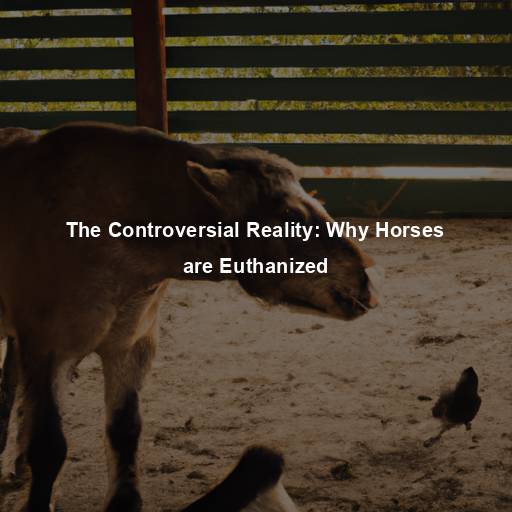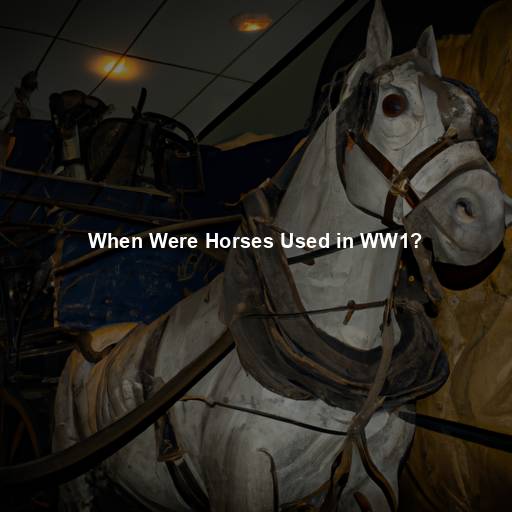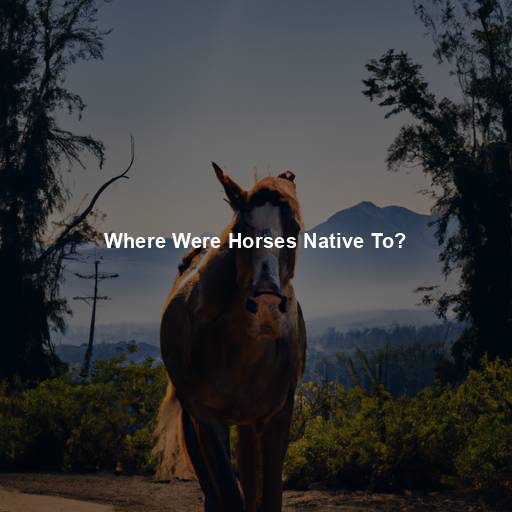The Controversial Reality: Why Horses are Euthanized
Last Updated on July 20, 2023 by Evan
Contents [hide]
- 1 The Unfortunate Fate of Horses
- 2 The Most Common Reasons for Horse Euthanasia
- 3 Ethical Considerations and Alternatives
- 4 The Emotional Toll
- 5 Moving Forward with Compassion
- 6 The Emotional Impact on Horse Owners
- 7 The Importance of Education and Advocacy
- 8 A Call for Compassion and Understanding
- 9 The Role of Legislation and Policy
- 10 The Importance of Compassionate End-of-Life Care
- 11 FAQs: Why Horses are Euthanized
- 11.1 What are some common reasons horses are euthanized?
- 11.2 Is euthanasia the only option for horses with health issues?
- 11.3 Who typically makes the decision to euthanize a horse?
- 11.4 Are there any laws or regulations around horse euthanasia?
- 11.5 Is euthanizing a horse a painful process?
- 11.6 Can horses be euthanized for non-health-related reasons?
- 11.7 What happens after a horse is euthanized?
The Unfortunate Fate of Horses
For centuries, horses have captivated our hearts with their regal presence and immense strength. They embody elegance and allure, becoming both our trusty steeds and our steadfast friends along the winding roads of history. Yet, behind the veil of their enchanting personas, lies a somber reality – the somber reality of euthanizing these majestic creatures. It is a topic that stands at the crossroads of unease and contemplation: why are horses met with such a fate?
Understanding Euthanasia
Before we explore the reasons behind horse euthanasia, it is essential to understand what it entails. Euthanasia, derived from the Greek words meaning “good death,” is the intentional act of ending an animal’s life to alleviate suffering. It is a difficult decision that no horse owner or caretaker takes lightly. The goal is to prevent unnecessary pain and provide a humane exit from a life that has become unbearable for the animal.
The Most Common Reasons for Horse Euthanasia
While each case is unique, several common reasons lead to the difficult decision of euthanizing a horse. Let’s explore them in more detail.
Severe Injury or Illness
Sometimes, our noble equine companions find themselves in the depths of despair, afflicted by injuries and illnesses that shatter their very essence. Trapped in a vortex of torment, these magnificent creatures are rendered incapable of embracing the joy that life has to offer. In these heart-wrenching moments, the merciful act of euthanasia emerges as a bittersweet solace, bestowing upon them redemption from the clutches of endless agony.
Advanced Age
As horses gracefully mature, their bodies may begin to express their journey through the manifestations of health challenges such as arthritis, dental complexities, and potential organ decline. During this perplexing period, it becomes imperative to embrace the notion of empathy and compassion for these magnificent creatures. In some instances, when an elder horse’s quality of life becomes entangled in a labyrinth of suffering, euthanasia emerges as an option of utmost kindness, allowing them to traverse the final path with dignity and devoid of prolonged agony.
Behavioral Issues
Horses are known for their gentle nature, but there are times when certain behavioral issues can lead to risk and uncertainty. From aggression to unpredictable behavior and uncontrollable fear responses, these problems can not only jeopardize the safety of handlers and other horses, but also put the horse itself at risk. When all options have been explored and the horse’s wellbeing is at stake, euthanasia may reluctantly become the last viable solution to avoid potential harm.
Financial Constraints
In the ever-changing landscape of horse ownership, financial hurdles have become an unfortunate reality that can lead to heart-wrenching choices. The weight of exorbitant veterinary bills, the unrelenting cost of medications, and the ongoing commitment to treatments can engulf even the most devoted owners in a cloud of bewildering uncertainty. As chronic conditions persist and the weight of financial constraints intensifies, the contemplation of euthanasia emerges as a bittersweet act of empathy, a somber last resort for those grappling with limited resources.
Lack of Suitable Homes
The issue of horse overpopulation and the limited availability of appropriate homes for retired or unwanted horses is a significant concern. When reputable rescue organizations and sanctuaries cannot accommodate all the horses in need, euthanasia may be seen as a more humane option than subjecting the animals to neglect, abuse, or a life of suffering.
Ethical Considerations and Alternatives
Deciding to say a painful goodbye to a beloved horse is a tumultuous journey filled with ethical quandaries that test the very core of our compassion. Navigating the choppy waters of this heart-wrenching decision demands unwavering honesty, fostering vital conversations among the equestrian family to confront the myriad concerns that arise. Furthermore, embracing the pursuit of alternative solutions could pave a less distressing path, ensuring that the need for such drastic measures is minimized, and the spirits of these majestic creatures can be preserved.
Palliative Care and Pain Management
In some cases, palliative care and pain management techniques can significantly improve a horse’s quality of life, allowing them to live comfortably for an extended period. By utilizing medications, alternative therapies, and specialized care, owners can provide relief and ensure their horses are as pain-free as possible.
Rehabilitation and Retraining Programs
For horses with behavioral issues, rehabilitation and retraining programs can often provide a second chance at a fulfilling life. Working with experienced trainers and behavior specialists, horses can overcome their challenges and find suitable homes or careers. These programs offer hope and an alternative to euthanasia for horses struggling with behavioral issues.
Responsible Breeding Practices
The delicate matter of excessive horse population urgently calls for a concerted effort towards the promotion of responsible breeding practices. By intensifying efforts to enlighten horse owners and breeders about the far-reaching repercussions of reckless breeding, we can effectively curtail the alarming number of unwanted horses and offer a glimmer of hope to overloaded rescue organizations, thus alleviating their mounting burden. Embarking on this perplexing journey will undoubtedly require a collective commitment to conquer this pressing issue head-on.
Supportive Networks and Rehoming Initiatives
Creating strong networks of support within the equestrian community can be instrumental in finding suitable homes for horses in need. Collaborative efforts between horse owners, rescue organizations, and adoption agencies can help match horses with loving and responsible owners, reducing the necessity for euthanasia.
The Emotional Toll
The decision to euthanize a horse is undoubtedly one of the most emotionally challenging experiences for any horse owner or caretaker. The bond between humans and horses transcends words, making the loss all the more profound. It is crucial for those facing this decision to seek emotional support from friends, family, and professionals who understand the unique connection between humans and horses.
Moving Forward with Compassion
As we navigate the complexities surrounding horse euthanasia, it is vital to approach the topic with empathy and compassion. By fostering open discussions, exploring alternatives, and promoting responsible horse ownership, we can strive to minimize the instances where euthanasia becomes necessary. Let us never forget the incredible impact horses have on our lives and work towards ensuring that their well-being remains a top priority. ## The Role of Veterinary Professionals
Making the heart-wrenching choice to euthanize a beloved horse is a weighty decision that demands the guidance and support of knowledgeable veterinary professionals. Entrusting veterinarians with the task of assessing the horse’s condition, exploring treatment possibilities, and ultimately determining the most compassionate course of action is of paramount importance. Their invaluable expertise guarantees that the final decision aligns with the horse’s welfare and best interests, ensuring a dignified farewell.
Communication and Consent
Clear and open communication between the horse owner and the veterinarian is essential throughout the euthanasia process. The veterinarian should explain the diagnosis, prognosis, and available treatment options in a compassionate and understandable manner. It is crucial for the owner to provide informed consent before proceeding with euthanasia, allowing them to fully comprehend the situation and make an educated decision.
The Process of Euthanasia
There is a multitude of pathways when it comes to the delicate topic of euthanasia. The course of action chosen can be as unique as the varied circumstances surrounding the situation, often leaving one to juggle both perplexity and moral responsibility. In the realm of equine euthanasia, two prominent methods emerge from the flurry of possibilities: the graceful intravenous injection and the somber gunshot. While the former envelops the horse in a tranquil passage, the latter demands the precision of an expert marksman when all other avenues fade away.
The Emotional Impact on Horse Owners
The decision to euthanize a horse is undoubtedly emotionally challenging for horse owners. The bond between humans and horses is often deep and profound, making the loss akin to losing a beloved family member. The grieving process can be complex and unique to each individual, but it is crucial to provide support and understanding during this difficult time.
Coping with Grief
Losing a beloved horse is undeniably a bewildering and heart-wrenching experience that propels a myriad of emotions. It is a testament to the deep bond we form with these magnificent beings, and it is crucial for horse owners to acknowledge and embrace the full spectrum of grief that ensues. Harnessing the power of connection, be it through the solace of loved ones, the joys of shared experiences, or the solace offered by support groups catered to equine loss, can aid in navigating this tumultuous journey.
Memorializing the Horse
For horse enthusiasts, the bond with their cherished equine friend goes beyond mere companionship. It’s a deep connection that lingers even after their beloved horse has crossed the Rainbow Bridge. To ease the heartache and preserve the memory, horse owners often find solace in crafting personalized tributes, be it a delicately engraved plaque, a serene garden retreat, or a heartfelt homage. Moreover, recounting treasured anecdotes and affectionate tales about the equine companion to like-minded individuals who shared in the love helps to keep their vibrant spirit alive in our hearts.
Time and Healing
Recovering from the profound emptiness that follows losing a cherished horse is a journey far from linear. The intricate tapestry of grief weaves differently for each person, making it impossible to prescribe a fixed timeline for healing. Nurturing oneself through activities that ignite happiness and seeking solace in the companionship of those who comprehend the intricate bond between humans and these majestic creatures can provide solace during this bewildering voyage.
The Importance of Education and Advocacy
In the intricate realm of horse euthanasia, the pivotal role of education and advocacy cannot be undermined. By fostering a deep understanding of responsible horse ownership, promoting the significance of conscientious breeding practices, and ensuring accessible resources for retired or unwanted horses, we can artfully sidestep the disheartening scenarios where euthanasia emerges as the solitary recourse. Let us embark on this challenging journey, armed with knowledge and compassion, as we strive to unravel the complexities of this matter.
Educational Initiatives
In an ever-evolving world of equine care, it is crucial to embrace educational endeavors that target horse owners, breeders, and even the ordinary folks. By nourishing a community that values information and empathy, we embark on a journey to diminish the troubling instances where euthanasia becomes the only perceived option. Together, let us sow the seeds of awareness and create a haven for responsible horse care.
Collaboration and Support
Collaboration between various stakeholders, including horse owners, veterinarians, rescue organizations, and policymakers, is key to developing comprehensive solutions. By working together, these groups can pool their resources, share expertise, and advocate for the welfare of horses. Supportive networks and partnerships can help ensure that horses in need receive the care and attention they deserve.
Legislative Measures
Promoting responsible ownership of our noble equine companions and safeguarding their welfare should be at the forefront of legislative initiatives. By implementing tighter regulations on breeding practices and ensuring the robust enforcement of animal welfare laws, we can tackle the heart-wrenching issue of euthanasia head-on. Additionally, extending a helping hand to horse owners facing financial hardships through financial aid programs can make a remarkable difference in curbing the frequency of these heartbreaking decisions. Let us stride toward a future where no horse is subjected to needless euthanasia, with legislation as our compass.
A Call for Compassion and Understanding
When contemplating the euthanasia of horses, the intricate web of emotions and opinions becomes undeniably entangled. It is never a subject that can be approached lightly, for it demands a delicate balance of understanding and compassion. Horse owners find themselves wrestling with heartbreaking decisions, grappling with the weight of ethical considerations as they navigate this enigmatic landscape.
In order to forge a path towards a more harmonious and equitable future, it is essential to advocate for responsible horse ownership. By fostering an environment that encourages education and support, we can empower horse owners to explore alternative solutions that may alleviate the often agonizing necessity of euthanasia for their beloved equine companions.
However, in this mosaic of perplexity, we must also confront our moral obligations. The welfare of these magnificent creatures should always take precedence; it is our solemn duty to ensure that they are afforded the care, love, and respect they deserve throughout their lives. Together, let us embark on this journey, navigating the labyrinthine forest of equine welfare, determined to illuminate a path forward that minimizes the need for euthanasia and maximizes equine well-being.
Making the tough call to euthanize a beloved horse is undoubtedly heart-wrenching for any owner. However, it’s crucial to step back and assess the wider ramifications on equine welfare. Reflecting on the larger picture allows us to grasp the complex hurdles faced by the equine community and strive for thoughtful, humane interventions that address these challenges head-on.
Overpopulation and Limited Resources
The equine realm is currently grappling with a pressing matter that continues to perplex many: overpopulation. The root causes, namely the troubling combination of reckless breeding methods and insufficient housing options for retired or undesirable horses, have created a whirlwind of uncertainty. Rescue organizations and sanctuaries, the unsung heroes of this tumultuous tale, find themselves inundated with a staggering influx of horses in dire need, pushing their already stretched resources to their breaking point. Tragically, in certain instances, euthanasia emerges as a heart-wrenching but necessary alternative to spare these horses from a life of neglect and misery.
Economic Factors
The cost of horse ownership can be significant, including expenses for feed, veterinary care, boarding, and training. Economic downturns or unexpected financial hardships can make it challenging for horse owners to provide the necessary care for their animals. In such situations, euthanasia may be considered as a compassionate choice to prevent neglect or abandonment due to financial constraints.
Responsible Ownership and Education
In a world where the fate of horses hangs in the balance, there is an urgent need for responsible horse ownership to take center stage. By shining a light on this issue, we can prevent the heartbreaking reality of euthanasia becoming the sole solution. Let us embark on a journey of education and awareness, enlightening potential horse owners about the undeniable financial and time commitments that come hand in hoof with equine care. Together, we can unravel the mysteries of adoption, guiding the public away from sinister backyard breeders and towards the open arms of reputable sources.
Supporting Equine Rescues and Sanctuaries
In a world where horses often find themselves in dire straits, the efforts of rescue organizations and sanctuaries shine like beacons of hope. These saviors take up the noble task of providing a sanctuary, a refuge for these majestic creatures in their darkest hours. It is through the support of kind-hearted individuals who selflessly donate their time, resources, and love that the plight of these horses can be eased. By banding together and fostering a network of well-regulated facilities, we can ensure that no horse is left behind, and euthanasia becomes a dreaded last resort, not an everyday occurrence.
The Role of Legislation and Policy
In the realm of equine well-being, the power wielded by legislation and policy cannot be underestimated. As we navigate the perplexing landscape of horse euthanasia, it becomes evident that laws safeguarding the welfare of these majestic creatures – coupled with measures promoting responsible ownership – hold the key to averting needless tragedies. By creating a framework that nurtures and sustains equine care, policymakers have the chance to weave a protective safety net around our equine companions, ensuring their lives are cherished for the entirety of their existence.
Animal Welfare Laws and Enforcement
In a world rife with uncertainty and perplexity, one thing remains unequivocally clear: the need for stricter animal welfare laws. These laws, like a protective fortress, create a sturdy legal framework to shield our cherished equine companions from the clutches of neglect, abuse, and unnecessary suffering. But here’s the kicker: enforcement of these laws is the key, the magical pixie dust that holds individuals accountable for their actions and guarantees that horses are not subjected to inhumane conditions. So, how can we, mere mortals, make a difference?
Breeding Regulations and Oversight
In our ever-evolving equine landscape, the desperate need to tackle the delicate issue of overbreeding begs for a robust and thought-provoking approach. It is high time we delve into the realms of implementing stringent regulations and closely monitored oversight within the esteemed equine industry. Through the diligent execution of responsible breeding practices encompassing the likes of registration requirements, cutting-edge genetic testing, and the mandatory licensing of breeders, we can reign in the unfettered influx of hoofed creatures into our world. Our ardent advocacy for legislative measures that champion responsible breeding endeavors while firmly discouraging the indiscriminate propagation of equines will pave the way to a future where the scourge of unwanted horses diminishes, and the dire need for euthanasia recedes.
Financial Support for Horse Owners
In these unpredictable times, when financial difficulties cast a shadow on even the most passionate equestrians, it becomes imperative to explore avenues that safeguard our equine companions. A glimmer of hope flickers through the existence of financial support programs tailored for horse owners facing economic hardships, preventing the dreaded specter of euthanasia due to the haunting constraints of money. With the aid of government-backed assistance programs and benevolent grants allocated exclusively for equine welfare, essential elements such as veterinary expenses, feed, and temporary boarding find their lifeline, offering respite and solace to owners in dire need. By championing the cause and rallying for the proper allocation of resources, we pave the way for a brighter future, where horses can bask in the care and attention they rightfully deserve.
The Importance of Compassionate End-of-Life Care
Making the heart-wrenching choice of euthanasia for a beloved horse can plunge even the most hardened equestrian into a whirlwind of doubt and emotion. But as perplexing as it may seem, embracing the paramount importance of prioritizing the horse’s welfare and tranquility during their final moments becomes a beacon of clarity amidst the storm. By embarking on a journey guided by empathy and tender care, we embark on a path that allows our equine companions to transcend with grace and nobility.
Veterinary Expertise and Support
When it comes to the heart-wrenching decision of euthanizing a beloved horse, it is crucial to involve the expertise of veterinary professionals every step of the way. These compassionate individuals possess a deep understanding of the horse’s well-being and can offer invaluable guidance tailored to the unique circumstances and condition of the animal. By entrusting the veterinarians with this difficult task, the owner can find solace in knowing that the process is carried out with utmost compassion, lightening the emotional burden for all involved parties.
Minimizing Stress and Discomfort
Creating a calm and comforting environment for the horse during euthanasia is paramount. Minimizing stress and discomfort can be achieved by choosing a familiar location, utilizing sedatives if necessary, and ensuring that the horse is surrounded by trusted individuals. By prioritizing the horse’s comfort and emotional well-being, we can provide a peaceful passing.
Respectful Aftercare
After the horse has passed, it is essential to handle their remains with respect and dignity. Owners should have options for aftercare, including burial, cremation, or donation to research or educational institutions. Providing resources and support for proper aftercare allows owners to navigate this aspect of the process with care and consideration.
FAQs: Why Horses are Euthanized
What are some common reasons horses are euthanized?
When it comes to the bewildering topic of why horses are laid to rest, a multitude of factors unfurl like a cascade of perplexity. Chief among them is the heart-wrenching occurrence of catastrophic injuries that leave a horse’s limbs or vital organs irreparably damaged. These profound tragedies can stem from accidents, fractures, or other calamities, resulting in excruciating pain or a dreaded loss of function for these majestic creatures. Furthermore, there exists the tragic reality of euthanizing horses as they reach the twilight of their lives, or when they are burdened by chronic and incurable afflictions that erode their once vibrant existence. In these instances, the decision to release them from their suffering becomes a poignant act of compassion, preventing needless anguish from engulfing their twilight years.
Is euthanasia the only option for horses with health issues?
When it comes to our beloved equine companions facing health challenges, the question of euthanasia can stir up a whirlwind of conflicting emotions. While it may seem like the only solution in instances of crippling injuries or incurable diseases, the decision is by no means straightforward. Sometimes, alternative treatments or interventions can provide a glimmer of hope, offering horses a chance to reclaim their vitality. Only after exploring every avenue and leaving no stone unturned should euthanasia ever be broached as a merciful last resort.
Who typically makes the decision to euthanize a horse?
The decision to euthanize a horse is typically made by the horse’s owner in consultation with veterinary professionals. Owners are responsible for the overall well-being of their horses and are entrusted with the difficult decision-making process regarding their horse’s end-of-life care. Veterinarians play a crucial role in providing owners with all the necessary information and guidance about the horse’s condition, treatment options, and prognosis, allowing them to make an informed and compassionate decision.
Are there any laws or regulations around horse euthanasia?
The ever-evolving landscape of horse euthanasia muddles the path to clarity, as regulations zigzag across different corners of the globe. From one jurisdiction to another, a web of animal welfare laws entangle the practice of easing an equine’s suffering, aiming to navigate the fine line between compassion and cruelty. Licensing and expertise become essential as these laws demand the presence of bonafide professionals, trained to embrace the arduous task of minimizing the agony and anguish in this hardest of goodbyes. Furthermore, a tapestry of guidelines and protocols weaves its way through veterinary associations and organizations, working tirelessly to uphold responsible and tender euthanasia practices, particularly tailored to the noble creatures that are horses.
Is euthanizing a horse a painful process?
When it comes to the delicate matter of euthanizing a horse, it is essential to entrust the procedure to a skilled and licensed veterinarian. Their expertise ensures that the process is carried out with utmost care, aiming for a peaceful and painless experience for the animal. Through the administration of a barbiturate drug, like pentobarbital, the horse gracefully drifts into unconsciousness before its heart gently ceases to beat. Adhering to recommended protocols and seeking the assistance of competent professionals guarantees the humane nature of this solemn act.
When it comes to horse euthanasia, our understanding is often centered on health-related concerns. Yet, there exist those peculiar occasions where non-health factors enter the perplexing equation. Picture this: a horse presenting a grave danger to human safety, showcasing a wild aggression or a chaotic demeanor that defies all efforts to subdue it. In these extraordinary cases, reluctantly, euthanasia might emerge as the ultimate option, but let us be clear, such weighty decisions are never taken lightly. They unfold through a labyrinthine process of consultations with equine behavior specialists and seasoned professionals, who are intimately acquainted with the particular circumstances at hand.
What happens after a horse is euthanized?
When it comes to bidding farewell to a beloved horse, the path forward can be a perplexing one, filled with a secret dance between legality and emotion. Local laws and regulations loom overhead, dictating what can and cannot be done with the remains. Some owners may choose to keep the horse close, laying it to rest on their own property if permitted. Others may opt for cremation, transforming the majestic creature into ethereal ashes. Alternatively, the horse’s final journey may involve a pilgrimage to a designated disposal facility. In rare instances, an owner may choose to bestow the horse upon the realm of science by donating its body for research or veterinary education. Ultimately, in this somber moment of decision-making, it is crucial for the owner to select the most respectful and fitting option that befits the horse’s legacy.







